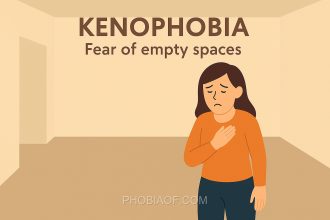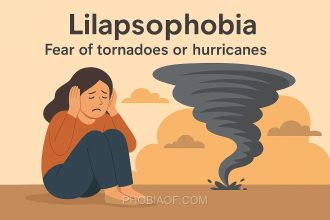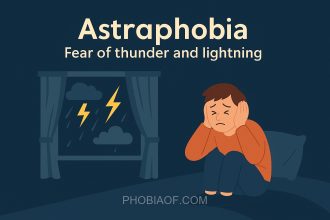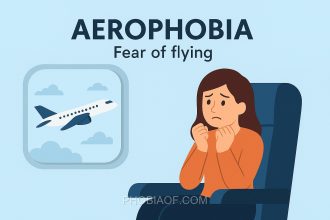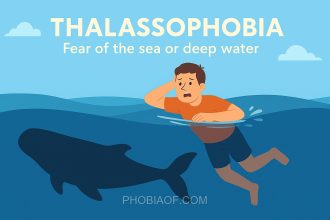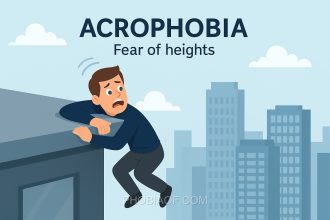Have you ever felt a chill run down your spine when the lights go out? If so, you’re not alone. Many people experience anxiety when they face the absence of light, and for some, this fear can be overwhelming. This intense fear is known as nyctophobia, which is a common phobia affecting individuals of all ages.
Nyctophobia, derived from the Greek words “nyx” meaning “night” and “phobos” meaning “fear,” is essentially the fear of the dark. This fear is not just about being in a dark room; it can significantly impact a person’s daily life and emotional well-being.
For those who experience nyctophobia, the thought of darkness can trigger a variety of symptoms and responses. Generally, this phobia can affect people in the following ways:
- Experiencing intense anxiety or panic attacks at night or in dark environments.
- Avoiding situations where they might be in the dark, such as going out in the evening or entering unlit areas.
- Having difficulty sleeping due to fear of the dark, leading to insomnia or restless nights.
- Feeling a loss of control or heightened vulnerability when in darkness.
Understanding nyctophobia is the first step towards addressing it compassionately. It’s important to acknowledge that this fear, while common, can be deeply personal and requires sensitivity and support to manage effectively. If you or someone you know struggles with this fear, seeking professional help can be a beneficial step towards overcoming it.
Causes of Nyctophobia
Nyctophobia, or the fear of the dark, is a common phobia that can affect individuals of any age. Understanding the potential causes of nyctophobia can help in addressing and managing this fear. Below are some common reasons why someone might develop nyctophobia:
- Genetic Predisposition:
Research suggests that phobias can run in families, indicating a genetic component. If a family member has an anxiety disorder or specific phobia, there might be a higher likelihood of developing similar issues, including nyctophobia.
- Traumatic Experiences:
Experiencing a traumatic event in the dark, such as getting lost at night or being involved in an accident, can trigger a long-lasting fear of the dark. Such experiences can create strong negative associations with darkness.
- Learned Behavior:
Children often learn behaviors from observing those around them. If a parent or sibling displays a fear of the dark, a child might adopt this fear as well. This learned behavior can continue into adulthood if not addressed.
- Psychological and Environmental Factors:
General anxiety disorders can exacerbate fears, including the fear of the dark. Environmental factors, such as living in a dangerous neighborhood or experiencing frequent power outages, can also contribute to heightened anxiety when it gets dark.
Interestingly, some theories suggest that a fear of the dark is an evolutionary trait. In ancient times, darkness was associated with increased risk from predators, leading to a natural wariness of the dark. While this might no longer be a threat, the ingrained fear can persist in modern times.
Understanding these potential causes is crucial for those seeking to overcome nyctophobia, as it can guide effective treatment strategies. Whether through therapy, gradual exposure to darkness, or other methods, addressing the root cause can help alleviate this common fear.
Symptoms of Nyctophobia
Nyctophobia, the fear of the dark, can evoke intense fear or anxiety in those who experience it. This phobia often manifests through a combination of physical and emotional symptoms. Recognizing these symptoms is crucial for understanding the impact it can have on individuals:
- Intense Fear or Anxiety: A profound sense of dread or panic when anticipating or experiencing darkness.
- Panic Attacks: Sudden bouts of intense fear that may include difficulty breathing, chest pain, or a feeling of impending doom.
- Sweating: Excessive perspiration triggered by the fear of the dark.
- Rapid Heartbeat: An increased heart rate as the body responds to the perceived threat.
- Trembling or Shaking: Physical trembling as a response to intense fear.
- Nausea: Feeling sick to the stomach due to anxiety associated with darkness.
- Avoidance of Triggers: Actively avoiding situations or places where darkness is present, such as refusing to enter dark rooms or go outside at night.
- Overwhelming Dread: A persistent and irrational fear that can linger even in safe environments.
- Emotional Distress: Feelings of helplessness or a lack of control over the fear.
- Difficulty Sleeping: Trouble falling or staying asleep due to fear of darkness during nighttime.
When severe, these symptoms can significantly interfere with daily life, making it challenging to engage in normal activities or maintain a healthy sleep routine.
Treatment for Fear of the Dark (Nyctophobia)
Nyctophobia, or the fear of the dark, is a common phobia that can be treated and managed effectively over time. If you or someone you know is struggling with this fear, it’s important to remember that you’re not alone and there are several treatment options available that can help you overcome it. Let’s explore some proven therapies and coping strategies that can support you on this journey.
Therapies for Nyctophobia
- Exposure Therapy: This therapy involves gradually and systematically facing the fear of the dark. By slowly increasing exposure to darkness in a controlled and safe environment, individuals can reduce their fear response over time. This method helps to desensitize the mind to the fear stimulus.
- Cognitive-Behavioral Therapy (CBT): CBT focuses on changing the fearful thoughts and negative patterns associated with the dark. By identifying and challenging these thoughts, individuals can develop healthier thinking patterns and reduce anxiety related to darkness.
- Counseling: Speaking with a mental health professional can provide support and guidance. Counseling offers a safe space to explore the root causes of the fear and develop coping strategies to manage it effectively.
Self-Help Coping Techniques
- Relaxation Exercises: Techniques such as deep breathing, progressive muscle relaxation, and visualization can help calm the mind and reduce anxiety when facing darkness.
- Meditation: Practicing mindfulness and meditation can increase awareness and control over anxious thoughts, helping to foster a sense of calmness and reduce fear.
- Support Groups: Joining a support group with others who have similar fears can provide a sense of community and shared understanding, which can be incredibly reassuring and empowering.
Considerations for Severe Cases
In some cases, medication such as anti-anxiety meds might be considered, especially if the fear of the dark is severely impacting daily life. However, the focus should remain on therapy and coping skills as the primary treatment methods.
If nyctophobia is interfering with your life, it is crucial to seek professional help. A mental health professional can tailor a treatment plan specific to your needs and guide you on the path to overcoming this phobia.
Remember, overcoming a phobia takes time and patience, but with the right support and strategies, it is entirely possible to manage and reduce your fear of the dark. Reach out for help, and take the first step towards a more fearless future.
Conclusion
Understanding the causes and symptoms of nyctophobia is a crucial step towards overcoming this common fear. By recognizing the triggers and manifestations of the fear of the dark, individuals can begin to demystify their anxiety and take proactive steps towards managing it. Knowledge is empowering, and when we understand the roots of our fears, we are better equipped to address them.
It’s important to remember that many people successfully overcome or manage their phobias with time, patience, and appropriate support. Whether through self-help strategies or professional guidance, progress is possible. If you or someone you know is struggling with nyctophobia, consider seeking support from a therapist or talking to a doctor. These professionals can offer valuable insights and coping strategies tailored to your unique needs.
Remember, you are not alone, and there is hope for a future free from the constraints of fear. With the right resources and support, you can regain control and find peace even in the darkest of nights.

